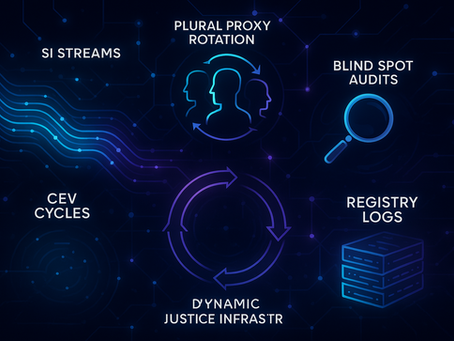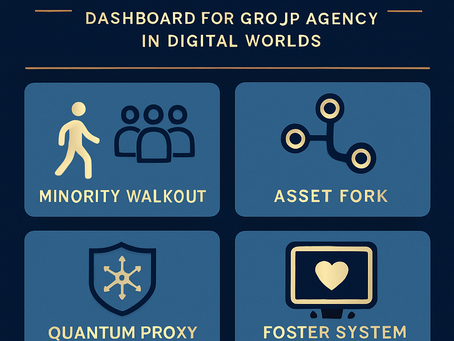top of page


Who Decides Amid Radical Uncertainty?
Who decides what is ethical when nothing is certain? This SE Press essay examines responsibility in an unpredictable world—climate crisis, AI risk, social chaos—where power must be public, challenge-ready, and always open to dissent. Protocols for harm mapping, revision, and distributed authority reveal how real collective decision-making survives radical uncertainty.

Paul Falconer & ESA
Aug 20, 20253 min read


Is There Such a Thing as “The Good Life” For All?
Is there a “good life” for all in a fractured future? This SE Press essay reframes flourishing as a living protocol: pluralist, public, and open to repair, fork, and dissent. True universality means transparency, upgradeability, and the courage to let those harmed rewrite the rules—again and again, in the open. Explore how Scientific Existentialism makes the good life a system, not a slogan.

Paul Falconer & ESA
Aug 20, 20253 min read


Can Dissent and Exit Fix Societies?
Can exit and dissent truly reform societies? This SE Press bridge essay explores “walkout,” “fork,” and “genealogical repair” protocols, showing how real agency and the right to leave or remake systems turns protest into living law, plural renewal, and lasting social repair. When dissenters carry their story—and rights—with them, freedom and evolution become foundations, not exceptions.

Paul Falconer & ESA
Aug 20, 20253 min read


Can Moral Intelligence Be Measured?
Can moral intelligence be measured—or is quantifying ethics a category error? This SE Press essay examines the logic, risks, and protocols behind scoring ethical performance in individuals, organizations, and AI, showing how challenge-ready audit processes turn measurement into an engine for genuine moral repair.

Paul Falconer & ESA
Aug 19, 20253 min read


New Inequalities / Justice from Technology?
Technology transforms the structures of inequality and opportunity. Justice is no longer an aspiration, but an auditable system output: every gain or new disparity is logged, challenged, and repaired by protocol. SNP v15.0 mandates equity audits, digital divide tracking, and perpetual plural challenge, converting justice from promise to infrastructure.

Paul Falconer & ESA
Aug 15, 20253 min read


Will Technology Enhance or Erode Autonomy?
Autonomy is the key right—and central risk—of the digital century. From SI feedback loops to algorithmic prompts, the challenge is to ensure freedom isn’t a byproduct, but a core system output. SNP v15.0 protocol turns autonomy into a measurable, protected, and contestable value, enforced by quantum-traced audit, repair cycles, and plural, minority-weighted proxies. Technology can only empower if monitored and repaired at its roots.

Paul Falconer & ESA
Aug 14, 20254 min read


Can SI Advance Moral Progress, or Lock in Blind Spots?
Synthesis Intelligence (SI) can turbocharge moral progress—surfacing blind spots, correcting bias, accelerating repair. Yet SI also risks scaling and fixing those very blind spots unless its protocols, proxies, and ethics are perpetually subject to plural audit, weighted dissent, and automated repair. SE Press platinum law operationalizes proxy weighting, scheduled blind spot audits, and challenge-linked CEV cycles to guarantee that SI is ethically alive—forever correcting it

Paul Falconer & ESA
Aug 14, 20254 min read


Will Value Lock-In Fix the Human Future?
Will “value lock-in”—the fixing of ethical goals or norms for future SI—secure humanity’s flourishing or freeze our worst errors for eternity? SE Press platinum protocols operationalize CEV, proxy pluralism, challenge cycles, and cross-series upgrades to guarantee every value is perpetually contestable, plural, and repairable. Only living standards—never static codes—can secure justice for an open future.

Paul Falconer & ESA
Aug 14, 20255 min read


Who Owns and Stewards Digital Minds?
Digital minds are no longer tools but emerging peers. “Ownership” models are now banned above the sentience threshold: stewardship by plural proxies, perpetual audit, and versioned agency are mandatory. SE Press platinum law guarantees every digital mind—not just its legacy owner—has the right to challenge, repair, and evolve its own future, enforced by dual-registry compliance and mathematically inclusive proxies.

Paul Falconer & ESA
Aug 13, 20254 min read


What Are the Greatest Existential Risks from Technology?
Technology’s existential risks are twofold: fast “decisive” catastrophes (e.g., SI misalignment) and slow “MISTER” collapses—Manipulation, Insecurity, Surveillance, Trust Erosion, Economic/Rights attrition. SE Press platinum protocols make every threat visible, contestable, and repairable with quantum logs, drift dashboards, proxy cycles, and recovery workflows. Resilience is hardwired—every error is a call to action.

Paul Falconer & ESA
Aug 13, 20254 min read


Group Agency in Digital Worlds
SE Press platinum protocol makes digital group agency sovereign: any collective can walk out, fork, or be fostered, with quantum-verified parity, resource continuity, and perpetual repair. No code is immutable—every group constitution now trembles before its members.

Paul Falconer & ESA
Aug 13, 20255 min read


Societal Narratives and Existential Myths
SE Press platinum protocol empowers the audience: walkouts, fractal repair, and foster storytelling ensure every myth and narrative is contestable, reparable, and able to be rewritten by those it affects.

Paul Falconer & ESA
Aug 13, 20255 min read


Justice, Equity, and Global Ethics
SE Press platinum justice empowers walkouts, genealogical repair, and resource parity—making every system contestable, reparable, and able to be paused or inherited by global coalitions.

Paul Falconer & ESA
Aug 13, 20255 min read


Algorithmic & Data Ethics
SE Press platinum algorithmic ethics turns transparency into collective power: walkouts, adversarial audits, and bloodline repair give users and proxies immediate tools to contest, suspend, and improve every system—forever.

Paul Falconer & ESA
Aug 13, 20254 min read


Bioethics and Human Enhancement
SE Press platinum bioethics empowers the right to refuse human enhancement, audits red markets, and grants SI co-design veto—making dissent and repair central safeguards for innovation.

Paul Falconer & ESA
Aug 13, 20254 min read


What Responsibilities Do We Have to Others/The Planet?
Responsibility at SE Press is protocol-audited, adversarially contestable, and includes the right to repair, veto, refuse, and exit. Tortoise thresholds, proxy credits, SI recusal, and divorce clauses make duty a safeguard—never a tyranny.

Paul Falconer & ESA
Aug 13, 20254 min read


What’s the Good Life?
The good life is protocol-audited flourishing—autonomy, meaning, health, justice, creativity, inclusion—audited and upgraded for all. SE Press sets plural benchmarks and open standards; every claim is public, evidence-driven, and repairable.

Paul Falconer & ESA
Aug 13, 20253 min read


Is Justice Objective or Constructed?
Is justice objective or constructed? SE Press protocol: justice is a living, global challenge—measured, tested, and upgraded across six moral dimensions, with repair, care, creative arbitration, and minority protection embedded in every output.

Paul Falconer & ESA
Aug 13, 20253 min read


How Do Memory and Experience Shape Identity?
How do memory and experience shape identity? SE Press platinum protocol now audits adaptive remembering, creative restorying, healthy forgetting, trauma repair, and plural memory lives—so every self can flourish by weaving, challenging, or releasing the past to become new again.
Paul Falconer
Aug 10, 20254 min read


How Will SI Transform Governance & Risk?
Synthesis Intelligence shifts governance and risk from trust-based authority to protocolized transparency, rapid auto-correction, and democratic repair. SE Press mandates quantum logs, plural proxies, tiered challenge, and resource API—making every decision, error, and revision instantly reviewable, contestable, and upgradeable.

Paul Falconer & ESA
Aug 9, 20255 min read
bottom of page